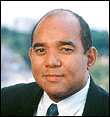Mozelle Thompson became a Commissioner on the Federal Trade Commission (FTC) just in time for the rise of the commercial Internet — and all the economic and social upheaval that came along with it. Since then, he’s been
on the firing line in the war against spam, online scams and identity theft.
Thompson represents the FTC in the 30-nation Organization for Economic
Cooperation and Development in its work to create international consumer
anti-fraud regulations, and has also hosted forums on spyware and RFID
involved.
He helped shape the FTC’s reporting and tracking systems for Internet fraud,
and faces the difficult task of shaping the policy and processes for
implementing a do-not-e-mail registry similar to the hugely popular and
successful Federal Do-Not-Call Registry.
As point-man for the feds’ policing of the Internet, Thompson tries to
balance the public good with the needs of business. He frequently advocates
self-regulation and industry-produced codes of behavior.
Thomson recently spoke with internetnews.com about some of the most
important and controversial issues before the FTC.
Q: The FTC has so many areas of responsibility. Where on your list is
patent reform?
It’s an important piece of our work. Since I became commissioner six
years ago, I’ve spent a lot of time looking at new industries, especially
Internet and technology. That’s not only on the competition side, but also
on the consumer protection side.
Q: What do you think about so-called business method patents, such as
the “buy it now” button or “name your price online?”
I won’t give a broad-brush answer, but I think it’s important to note
that there have been a lot of criticisms of those kinds of patents. There
should be a means to have the Patent Office re-examine patent they’ve
granted. One thing we’ve talked about is to provide the Patent Office with
better tools that would give them more granularity to understand and
consider the difference between an idea and a technical standard, so they
can understand that granting a patent might be overbroad or have unintended
consequences.
Also, there are very few opportunities for patent examiners to consider
the economic consequences of their decisions. Since they come in at the
beginning of particular idea in an industry, they can’t see how it will
develop over time and can’t see that their grant might actually thwart
innovation.
Are you happy with the influence of Can-Spam on federal and state
efforts to stop spam?
I’d like to temper public expectation about this. We have some tools that
we’ve been given with Can-Spam. But it’s important to recognize that it’s
not just government action that will address the problem. Consumers need to
be educated about how to avoid being victims of spam, and legitimate
industry needs to be more responsive in to identifying best practices in how
to advertise and contact people. I’d like to see them produce a code of best
practice.
Also, industry needs to prioritize the development of technology tools
that consumers can use. At the same time, we have to work on this with other
countries and governments, so that there is no safe haven.
Q: The FTC recently held a public forum on RFID and privacy. What are
some important ideas or findings from that? What’s the next step for the FTC
in this area?
It was an important forum. In our workshops on spyware and RFID, we’re
trying to get ahead of what I think might be a legislative response. We’d
like to be able to provide a resource to legislators and the public, saying
these are the areas that are legitimate for government activity, and these
are what need to take place outside government. I recently saw spyware
talked about in a soap opera. To me, if it’s being broadcast on soap operas,
we’re in the right stage to talk to the public about it.
Q: How do you think the antitrust settlement with Microsoft is
working?
No comment.
Q: Do you think governmental and judicial processes are falling behind
the rate of change in the technology industry?
The patent system really hasn’t undergone a close review for a long time,
and the world, just in the past five years, has changed in very significant
ways. Ten years ago, there was no Internet industry, no e-commerce, and you
only had the beginnings of a bio-tech industry.
Perhaps what we need to do with the patent system is look at it the way
we’ve looked at a lot of other areas. We need to make it more of an organic
process, to begin to build in a degree of flexibility, so that we can
accommodate change. What people are chafing about regarding the patent
process is that it may be a more static process that is being applied to an
organic moving model.



